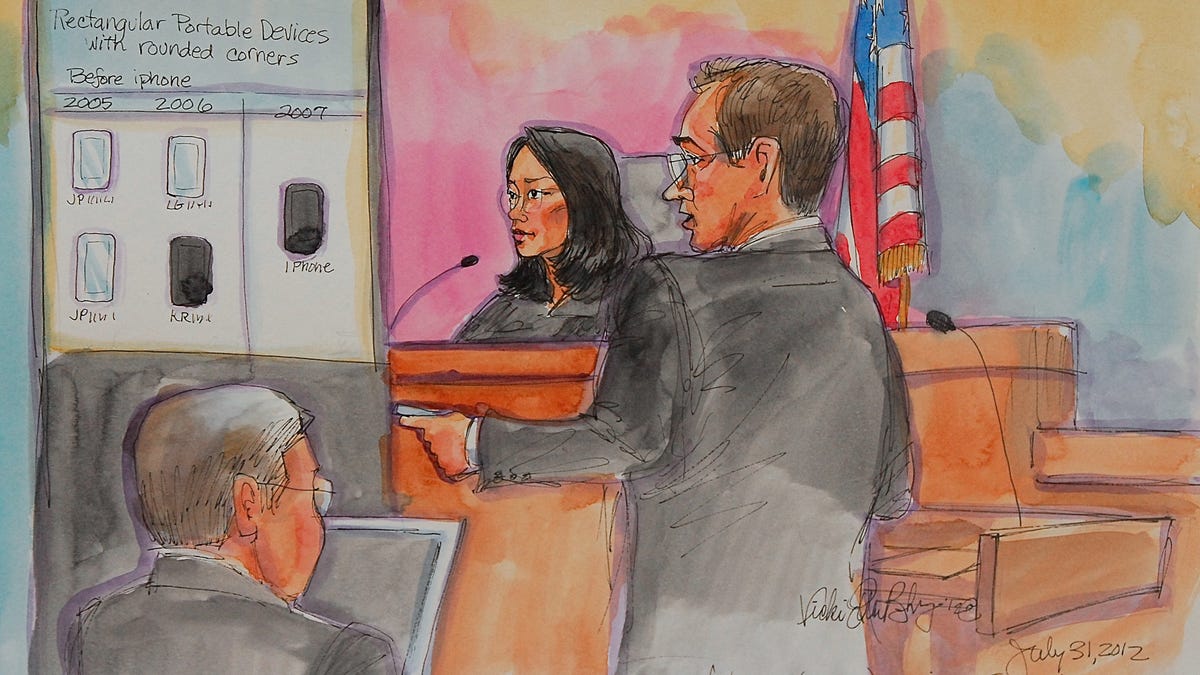Samsung closes by claiming Apple is stifling competition
In its closing argument, Samsung paints Apple as a company that threatens market competition in the U.S., and in tech at large.

SAN JOSE, Calif. -- While Apple has painted Samsung as a copycat, Samsung fired back today, saying that if Apple wins its case, consumers would lose.
"Your decision, if you go Apple's way, could change the way competition works in this country," Samsung attorney Charles Verhoeven told jurors after pointing to the large collection of press in the back of the courtroom who were there to see closing arguments from both sides in the Apple v. Samsung patent trial.
"Rather than competing in the marketplace, Apple is seeking a competitive edge in the courtroom," he said.
That argument has been at the center of where the two companies disagree. Where Apple has accused Samsung of quite literally copying the look and feel of its smartphones and tablets, Samsung has fired back saying that any design similarities are benchmarking, where companies keep up with rivals on things like screen size, battery life, and other core features.
Verhoven carried that theory of evolution over to other consumer electronics, including televisions, attempting to convince the jury that its designs changed because of the underlying technologies.
"Remember in the old days? TVs had knobs...they looked different," Verhoeven said. "Remotes came along, LCDs, plasma. Form followed function."
Knocking witnesses
Besides knocking Apple's design argument, Verhoeven took aim at some of Apple's top witnesses, homing in specifically on its design experts and Apple's claim that consumers were confused.
"You'd think that if Apple is going to ask for over $2 billion in damages, they might have used all the money for the lawyers and witnesses, and tell you if people have been deceived," he said.
"What did we have? [Design expert Peter] Bressler, [who] didn't do any studies, didn't talk to any people, didn't apply this standard. We had Dr. [Susan] Kare, who just looked at images. She just looked, and didn't give any analysis."
Instead, Verhoeven played up consumer intelligence, saying that as "ordinary observers," consumers "make choices, not mistakes."
Along the way he slammed testimonies from both Bressler and Kare, picking apart their takes on the design of the exteriors and software features on Samsung's devices. At one point that included putting up a slide of a Samsung home screen and saying that Apple wanted more than $2 million in damages for the 36 icons shown on the screen.
"I would submit the vast majority of the icons are substantially different," Verhoeven said. "Let's not think you can patent a colorful matrix of icons."
Apple's 'shell game'
Along with trying to wrap up Samsung's argument into a tidy package for the jury, Verhoeven used the time to play defense against some of Apple's main claims. That included a portrayal of Apple as a hustler, playing a "shell game" by mixing pieces of evidence together.
The centerpiece for that argument was evidence Apple rolled out earlier in the trial, and brought back out again in its closing arguments, showing that Samsung's semiconductor group had done a study on the iPhone. In its closing argument, Apple attorney Harold McElhinny had pointed to this as a sign of how deep the copycat culture went at Samsung.
"It's a shell game. Apple counsel is trying to mislead you. There's no malintent, there's no copying," Verhoeven argued. "If you put it in context instead of matching from different divisions, or using documents that aren't even accused...the copying claims fail."
In rebuttal, Apple attorney Bill Lee called the shell game, and innovation stifling claims "startling."
"Nobody has told Samsung to get out of the marketplace. Nobody is trying to get them to stop selling smartphones," Lee argued. "All we're saying is make your own designs. Make your own phones. Compete on your own innovations."
'Common sense' damages
A topic for both companies was damages, an amount that varies wildly depending on which expert you listen to. Apple's asking for $2.75 billion, while Samsung's targeting Apple for around $519 million. Verhoeven once again made the case that Apple had grossly overestimated.
"$2.75 billion in damages? Really?" Verhoeven asked. "What does it take to get a certified damages expert to agree with you on that?"
"We don't think Samsung should have to pay any damages," Verhoeven countered. "We don't think we're liable, but we have to address the issue of damages because this is the only chance."
Verhoeven pleaded with jurors to use "common sense" if they were to assign damages, going with Samsung's much smaller $22 million tally. Along the way that included taking a crack at Apple's methodology, which included spending $1.75 million on a program to calculate everything together.
Deliberations ahead
Samsung's closing came after Apple's, per the ordering of the trial. In Apple's closing the company made the case that jurors need simply look to the paperwork it had collected as part of the trial to show that Samsung had intentionally copied its designs.
Just before the arguments, jurors were read 109 pages of instruction that outlined the legal grounds behind the myriad laws and regulations that are a part of the case. U.S. District Court Judge Lucy Koh pleaded with the court to pay attention during what would be the difficult exercise of reading it aloud, something that ended up taking more than two hours, with a mandated break for stretching every 20 questions or so.
Still ahead are deliberations, which begin tomorrow.
Updated at 4:48 p.m. PT with additional details.
Complete coverage: Apple v. Samsung, a battle over billions

